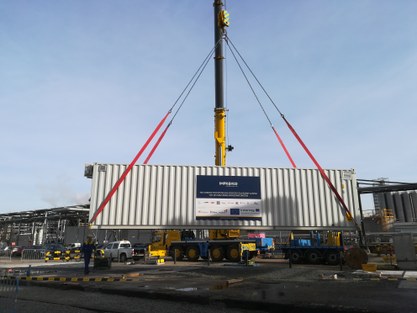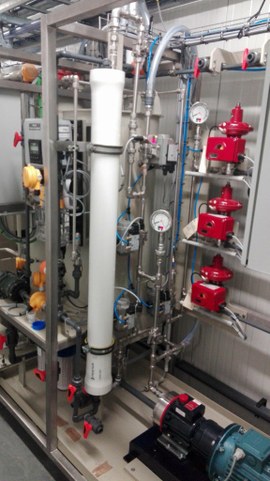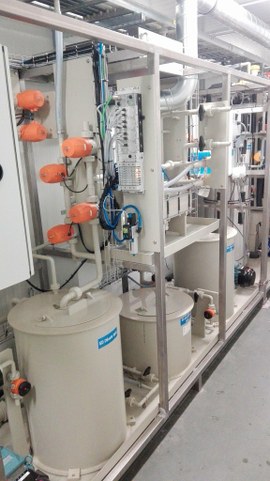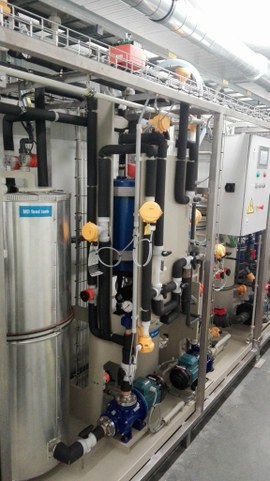Interreg Vlaanderen Nederland - IMPROVED
Interreg Vlaanderen-Nederland

Description of the project (Dutch summary)
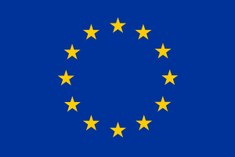
Modules will contain a diversity of technologies in a plug & play mode. This means that mobile unites will be equipped with different and interchangeable units, depending on the needs. Therefore, the set-up is suited for the location and can simulate the process water chain of interest. Tests and measurements will be comprised of both on- and off-line measurements to determine the physico-chemical treatment technologies, distribution impact and process performance of typical chemical downstream equipment like boilers, cooling towers, cracking systems.
The installation will be designed and developed during the first project year, together with EVIDES industriewater B.V. and Innovation Engineering & Construction N.V. (IEC NV) as pilot builder. During the following 2 project years, on-site testing will be performed on 3 industrial chemical sites : Dow Benelux BV, Yara Sluiskil BV and BASF Antwerp NV. Project communication is managed by "i-cleantech Vlaanderen" and "Het Vlaams Kenniscentrum Water (VLAKWA)" for the region of Flanders, while "Stichting Kennisuitwisseling Industriële Watertechnologie" manages this for the Netherlands. Knowledge centra like HZ University of Applied Sciences and Ghent University will both contribute for the research part, the technological innovations and the optimisation process.
Objectives
- Build 3 plug & play mobile units for water resource recovery in chemical industry
- Test and demonstrate industrial water reuse on-site
- Develop strategies for water treatment of the future by analyzing and processing data
Role of Ghent University
Ghent University is project leader and coordinator and therefore is involved throughout the whole project
The tests at Dow are nearing their end and the results from BASF have been published. Curious? Make sure to check the report from BASF here and join us for our final conference on September 26th by subscribing (for free!) here.”
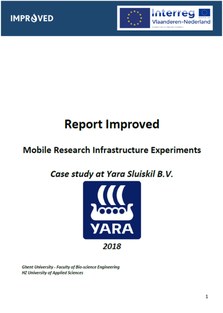
Results of Yara published and containers moved to Dow Benelux B.V.
We start the new year of with good news; the extension request for the IMPROVED project was granted and the project is now extended until the end of 2019, ensuring we can execute and finish all planned activities.
After finishing the testing at BASF, the IMPROVED installation was moved to Dow Benelux B.V. in November of 2018. Testing at Dow will focus on the treatment of polluted condensate streams for reuse as boiler feed water. During preliminary lab-experiments, ion-exchange resins showed great promise and these will be investigated further on site.
The final report on the Yara tests is now also available for downloading on the official IMPROVED website when you follow this link (Dutch website, scroll down for a link to the English report).
2020: IMPROVED project finishes
Officially, the IMPROVED project finished at the end of 2019. However, we are not planning to let all that knowledge and infrastructure go to waste! The project website will remain online, containing all relevant results obtained during the project, including the most recent results of the testing period at Dow. The mobile testing infrastructure becomes available for other research projects; you can still visit it here or have a more detailed look into the specs here. Also feel free to add your own pilots to the database we’ve started!
So it’s not goodbye, but until next time!
June 2018: The big move and testing begins at BASF
In March of 2018, tests at Yara were finished and in April, the containers moved to BASF for 6 months of testing there. At BASF, testing will focus on surface water treatment and condensate treatment, both for reuse of water. Some new technologies will be used in the infrastructure for the first time: nanofiltration, ion-exchange, advanced oxidation processes and activated carbon. These will be tested alongside reverse osmosis, membrane distillation and electrodialysis. The facilities will remain at BASF for 6 months, after which they will move again, this time to Dow for the final 6 months of testing within the IMPROVED project.
Figure 1. The IMPROVED containers are very easy to transport.
December 2017: continuous testing at Yara is started
In September 2017, the mobile infrastructure of module 1 has been placed on site at Yara Sluiskil B.V. The building and the programmation of the installation was finished by november 2017. In December 2017, the first continuous tests for Yara Sluiskil B.V. started with the installation that can run fully automatic. Ghent University and HZ University of Applied Sciences are working closely together for the daily operation of the installation.
Figure 2: Reverse osmosis (RO) Figure 3: Electrodialysis (ED) Figure 4: Membrane distillation (MD)
Contact
Prof. Arne Verliefde
Department of Applied Analytical and Physical Chemistry
Phone number: +32 (0)9 264 60 02
E-mail: Arne.verliefde@ugent.be
